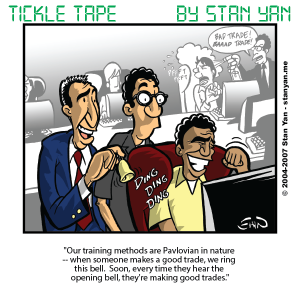After an extra-long commute in rush hour traffic, Jim arrives at his trading office an hour late. He’s groggy and uneasy. He had an argument with his wife after dinner yesterday and had difficulty sleeping for the third night in a row. He drinks a cup of black coffee in an effort to increase his energy level and looks at the progress of a swing trade he’s been watching for the past week. He sees that he has lost more than the 5% he had planned. He hits his fist on the table, and yells, “How did it go down so fast!” Angry and frustrated, he thinks, “I can’t take it anymore.” He shuts off his computer in disgust and goes for a walk.
Sound familiar? Jim is “stressed out” and unable to think clearly, but there’s a lot Jim could have done to prevent this “stress attack.” People experience stressful emotions when they unexpectedly face a barrage of obstacles that preclude them from reaching the desired goal. People vary on how stress influences them. Some people are extremely “stress-resilient” in that they can encounter many stressful events, yet still function in a relatively calm manner.
Others are more vulnerable to stress and experience extreme anger, fear, or frustration upon encountering just a few stressful events. Regardless of where you stand on this characteristic, there’s a lot you can do to prevent stress from getting the better of you, especially if you are a novice trader who finds many aspects of trading stressful (for example, putting your money on the line, or dealing in an ultra fast-paced chaotic environment).
It’s useful to practice stress prevention. Scientists have shown that stressful emotions can build up, and if not released occasionally, one can be overloaded by stress. Laboratory animals placed in stressful situations, for example, die if the stressful events are continuous and enduring. Thus, it’s essential to have a routine to release stress and let your mind rejuvenate. You can’t completely remove stress from the trading environment, but you can prevent the stressful aspects of trading from making you feel overly anxious and fearful. Here are some tips on how to develop an effective stress reduction plan:
(1) Avoid caffeine. Many people feel that caffeine helps them wake up in the morning, but many times, caffeine will elevate your nervous system too much. It operates in the background and makes your nervous system hyper-alert to the slightest form of stress. Trading is stressful enough; you don’t need to pre-elevate your nervous system, only to feel extra nervous when you face a stressful trading event.
(2) Exercise regularly. Many successful traders view exercise as a key component to creating a calm and relaxed mindset. It’s vital that you regularly release tension that builds up during the trading day. Exercise ensures that pent-up frustration and tension are released, and do not build up to influence subsequent trading decisions unexpectedly.
(3) Minimize background stressors. Daily hassles, such as minor arguments, traffic congestion, or feeling over-extended can work in the background and add up to be as equally stressful as a major life event (such as the death of a loved one). Try to minimize these hassles, and don’t ignore them by trying to pretend they aren’t important enough to deal with immediately. They can accrue and cause you great strain in the long run.
(4) Don’t exceed your trading skills. If you are new to trading, don’t put extra pressure on yourself by trying to achieve trading goals that you can’t achieve. For example, keep position sizes small and have clearly defined risk limits. If you push yourself beyond your skill level, you’ll not only feel extreme anxiety and fear, but you will probably unnecessarily deplete your account balance more rapidly and end up experiencing even more debilitating feelings of stress.


